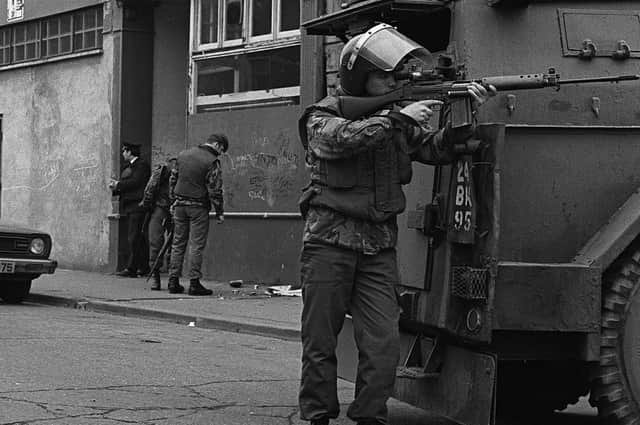Court battle ahead over government’s Troubles ‘amnesty’ plans


The controversial legislation – which has been widely criticised by victims groups – has been delayed but is expected to progress through Parliament before the summer.
At a court hearing in Belfast yesterday, relatives of two men shot dead by soldiers in the early days of the Troubles were cleared to progress their ongoing legal battle with the UK Government.
Advertisement
Hide AdAdvertisement
Hide AdIn November last year a judge dismissed attempts by Patricia Burns and Daniel McCready to judicially review proposals which would also end legacy-related inquests.
But their lawyers confirmed yesterday that the Court of Appeal will hear a challenge to that ruling in April.
Ms Burns said: “We have every faith that our courts in Northern Ireland will protect the rule of law.”
The legal action centres on the government’s controversial intention to prohibit future prosecutions of military veterans and ex-paramilitaries for incidents pre-dating April 1998. The plans, which have yet to be tabled in Parliament, are aimed at drawing a line under the Troubles, but are opposed by all the main political parties at Stormont and the Irish Government.
Advertisement
Hide AdAdvertisement
Hide AdProceedings were brought in an attempt to secure an advisory declaration on the lawfulness of the proposals before Secretary of State Brandon Lewis takes any further steps.
The High Court rejected the bid to judicially review potential legislation which it pointed out does not yet exist.
Mr Justice Colton held at the time: “I consider the challenge is unarguable and constitutionally impermissible.”
However, the two campaigners are continuing with the fight against amnesty plans their legal representatives have branded an unconstitutional attack on the rule of law.
Advertisement
Hide AdAdvertisement
Hide AdMs Burns’ father, former Royal Navy sailor Thomas Burns, was shot by the army outside Glenpark Social Club in north Belfast in July 1972.
Northern Ireland’s Attorney General has denied a fresh inquest into his death, despite flaws in the original tribunal.
Mr McCready’s uncle, Jim McCann, was among six men allegedly killed by soldiers in the New Lodge area of the city in February 1973.
In a statement at the time, the Army claimed they had been shot during a gun battle, but no weapons were recovered. Earlier this year the Attorney General ordered a new inquest into the deaths of the men, known as the New Lodge Six.
Advertisement
Hide AdAdvertisement
Hide AdAnnouncing the government’s proposed bill to deal with legacy issues last July, NI Secretary Brandon Lewis said: “We know that the prospect of the end of criminal prosecutions will be difficult for some to accept, and this is not a position that we take lightly.
“But we have arrived at the view that this would be the best way to facilitate an effective information retrieval and provision process, and the best way to help NI move further along the road to reconciliation.
“It is a painful recognition of the reality of where we are.”
——— ———
A message from the Editor:
Thank you for reading this story on our website. While I have your attention, I also have an important request to make of you.
Advertisement
Hide AdAdvertisement
Hide AdWith the coronavirus lockdowns having had a major impact on many of our advertisers — and consequently the revenue we receive — we are more reliant than ever on you taking out a digital subscription.
Subscribe to newsletter.co.uk and enjoy unlimited access to the best Northern Ireland and UK news and information online and on our app. With a digital subscription, you can read more than 5 articles, see fewer ads, enjoy faster load times, and get access to exclusive newsletters and content.
Visit https://www.newsletter.co.uk/subscriptionsnow to sign up.
Our journalism costs money and we rely on advertising, print and digital revenues to help to support them. By supporting us, we are able to support you in providing trusted, fact-checked content for this website.
Ben Lowry, Editor